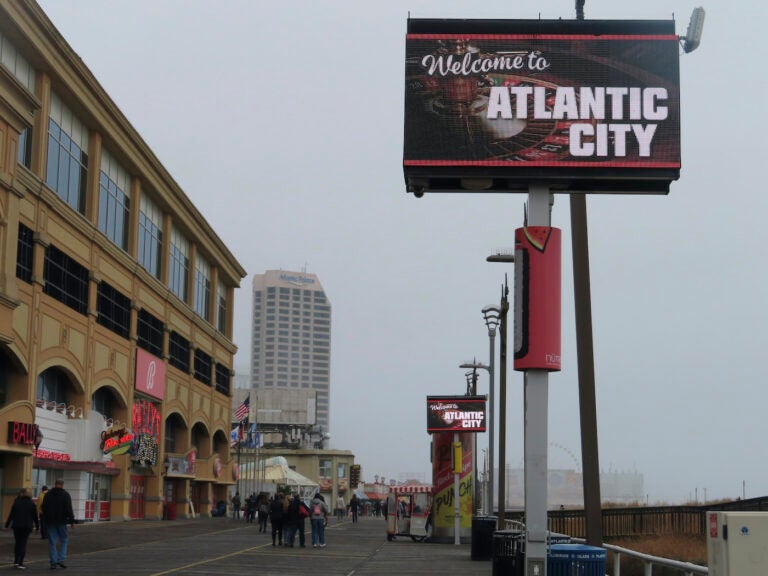Casino smoking and boosting in-person gambling are among challenges for Atlantic City in 2024
The most burning issue for Atlantic City in the new year is likely to be whether state lawmakers approve a measure to ban smoking in the nine casinos.

An electronic sign welcomes visitors to the Atlantic City, N.J. Boardwalk on Dec. 28, 2023. Atlantic City faces challenges in the new year including a potential smoking ban in its nine casinos, and their quest to return to pre-pandemic business levels. (AP Photo/Wayne Parry)
After the confetti is swept away and the empty champagne bottles recycled in Atlantic City, 2024 will bring numerous challenges and potential opportunities for the East Coast gambling resort.
The most burning issue for Atlantic City in the new year is likely to be whether state lawmakers approve a measure to ban smoking in the nine casinos.
High-profile anti-crime and pedestrian safety measures should show whether they, in fact, work. A new $100 million indoor water park at the Showboat hotel will have its first summer season.
And the physical casinos will be watching closely to see whether gamblers continue to more widely embrace internet gambling and sports betting at the expense of doing it in person inside the casinos.
Jane Bokunewicz, director of the Lloyd Levenson Institute at Stockton University, which studies the Atlantic City gambling and tourism market, believes 2024 could see a return to more normal patterns after pandemic-related disruptions.
“There are several reasons for optimism in looking ahead to 2024,” she said. “With recent gains in the stock market and a stabilization of inflation, consumer confidence may be improving, which could lead to increased spending on travel and entertainment.”
She said recent pay raises for casino and hotel workers have eased labor shortages somewhat.
And even though internet gambling continues to grow, nongambling attractions like the Showboat water park and the new Dave and Busters arcade, bar and restaurant should help attract new visitors to the resort, she said.
Mark Giannantonio, president of Resorts casino as well as the Casino Association of New Jersey, said the industry is upbeat about Atlantic City’s prospects in the new year “as we further transform Atlantic City into the leading regional gaming and tourism destination.”
This will mark the fourth year of a sustained push to close a loophole in the state’s public smoking law that specifically exempted casinos from smoke-free workplaces. Despite ever-growing support — most of the state Legislature has signed on as co-sponsors, and New Jersey’s governor promises he’ll sign it — the bill has been bottled up in state government committees without votes.
A December push fizzled when some lawmakers pivoted away from a full ban in favor of a compromise proposal favored by the casino industry that would build enclosed smoking rooms in which employees would volunteer to work. That approach is vehemently opposed by many casino workers who say nothing less than a full ban can protect their health and give them the same workplace protections that other workers in New Jersey are guaranteed.
Smoking is currently allowed on 25% of the casino floor, but those areas are spread out widely over the entire gambling area, with the effect that secondhand smoke is present and detectable even in nonsmoking sections.
“I’m hopeful that we will be in a smoke-free environment in the near future,” said Nicole Vitola, a Borgata dealer and one of the leaders of the push to ban smoking in the casinos. “It would have been a nice present this year.”
Other questions abound for Atlantic City in 2024: Can the casinos get back to and surpass the level of business they were doing before the COVID-19 pandemic, not just collectively but at each individual property?
In terms of money won from in-person gamblers — the casinos’ key business metric — only three casinos won more through the first 11 months of this year than they did over the same period in 2019, before the pandemic. They are the Borgata, Hard Rock and Ocean. Because money from internet gambling and sports betting must be shared with partners including tech platforms and is not solely for the casinos to keep, they view money won from gamblers on their own premises as their key business.
Will more gamblers risk their money online rather than traveling to Atlantic City to do it? Internet gambling brought in nearly $1.75 billion through the first 11 months of this year, and set a new monthly record in November.
Will the addition of more security cameras make the city safer?
And will a much-doubted project to narrow Atlantic Avenue — the main road through the city’s downtown — from two lanes in each direction to one, succeed in cutting down pedestrian accidents without tying the city into gridlocked knots on busy summer weekends or major concert nights? Five casinos and a hospital are challenging the plan in court; a hearing is set for Jan. 26.
Atlantic City is due for a government-funded beach replenishment project in 2024 to widen beaches that have become eroded over the years. Sand loss got so bad in the north end of the city that the Ocean casino paid $700,000 to have sand trucked in to what little remained of the beach in front of its casino in May.
Individual casinos plan to reinvest millions into their properties in the new year.
Ocean will renovate 506 hotel rooms at a cost of $25 million before summer arrives. Caesars will open its Nobu Hotel project with 85 rooms and suites in one of the final phases of parent company Caesars Entertainment’s $420 million investment into its three Atlantic City properties.
The Golden Nugget plans to complete the first phase of a $6 million renovation of 100 rooms and suites.
And 2024 could be the year significant decisions are made on an ambitious proposal to redevelop the former Bader Field airport property into a $2.7 billion automobile-themed housing, entertainment and recreation project.

Get daily updates from WHYY News!
WHYY is your source for fact-based, in-depth journalism and information. As a nonprofit organization, we rely on financial support from readers like you. Please give today.





